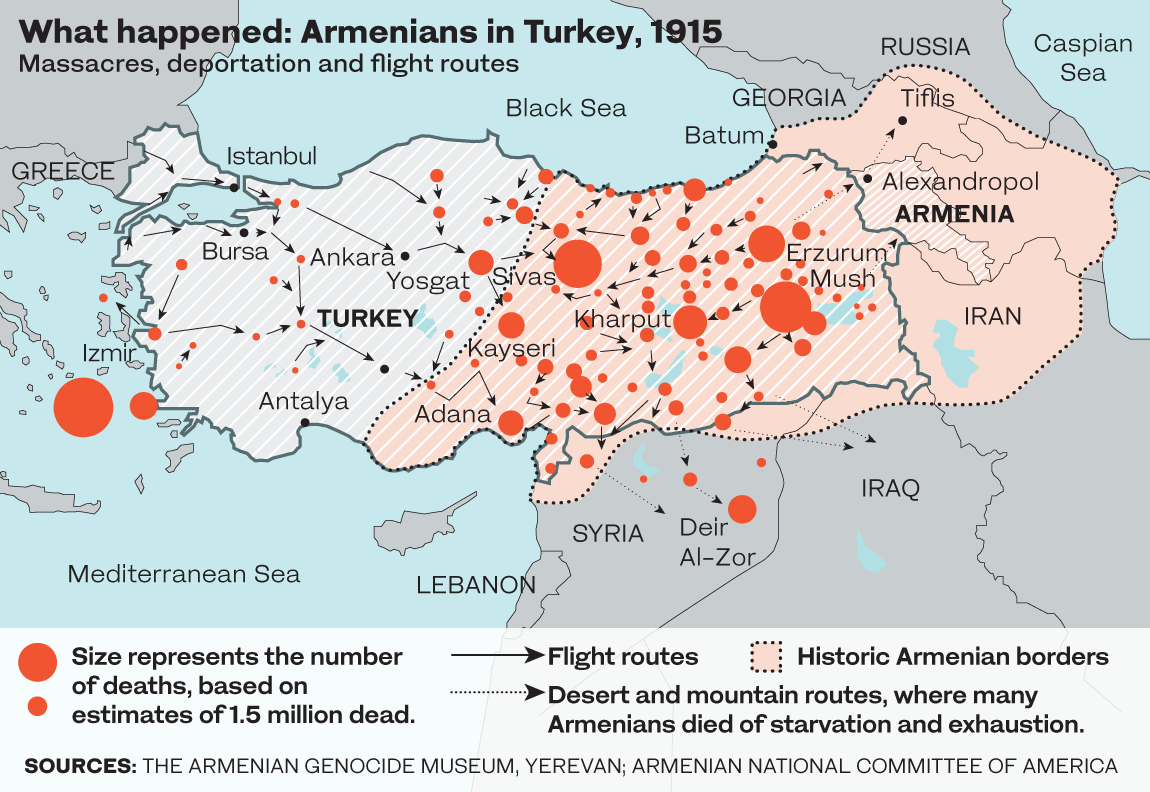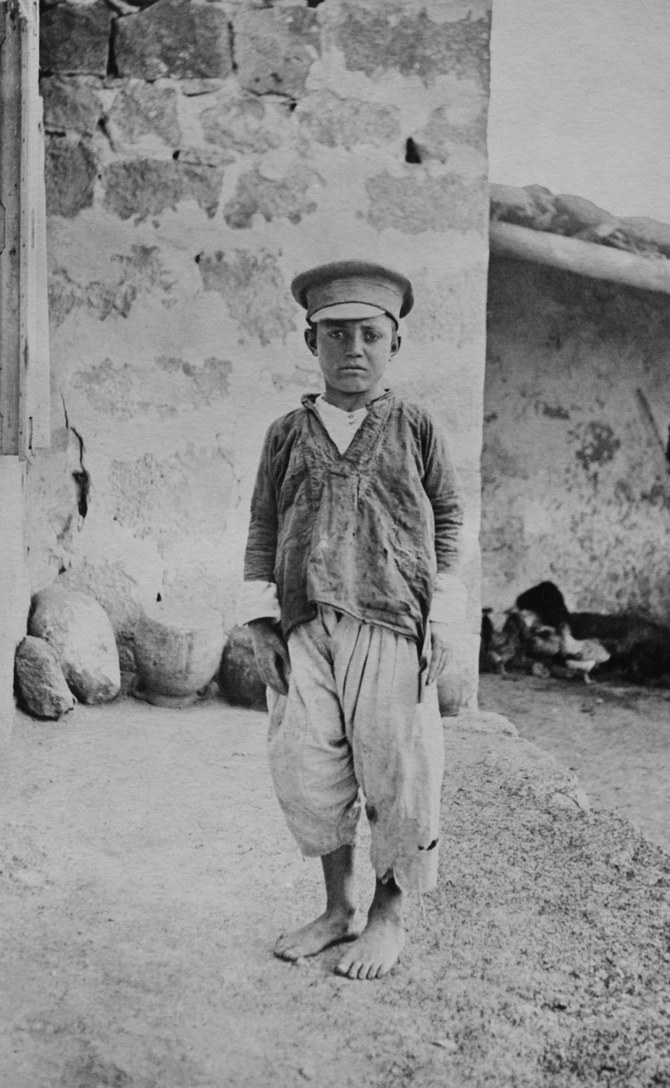DUBAI: October 29, 2019, has become another significant date in the history of Armenians worldwide after the US House of Representatives recognized the systematic killing of an estimated 1.5 million Armenians from 1915 onwards in modern-day Turkey as a “genocide”.
The House voted 405-11 on that day, the first time a chamber of the US Congress officially labeled the slaughter as a genocide.
The measure was adopted at a time when Ankara’s military intervention in northern Syria has strained already tense relations between the US political establishment and the government of President Recep Tayyip Erdogan.
The vote was widely seen as a stinging rebuke to President Donald Trump’s decision to pull American forces from northeastern Syria and the ensuing Turkish military onslaught on Kurdish-administered areas there.
“The adoption of House Resolution 296, which recognizes the Armenian genocide from 1915 to 1923, is first and foremost a victory for truth and justice,” said Levon Avedanian, coordinator of the Armenian National Committee of Lebanon (ANCL) and professor at Haigazian University in Beirut.
“October 29, 2019, is a historical day. This recognition is important for Armenia and Armenians, for Turkey and Turks, and also for the United States, since it places the US on the side of justice, which has, for far too long, been denied to the victims and surviving generations of the Armenian genocide.”
Avedanian described the recognition as a culmination of 35 years of efforts by Armenian Americans, led by the Armenian National Committee of America, to honor the memory of the 1.5 million victims of the genocide.
In addition to the House of Representatives, 49 US states have acknowledged the Armenian genocide, and a resolution in the Senate – Senate Resolution 150 – is currently gathering pace.
“It is our hope that the Senate resolution will also be adopted and, eventually, (lead to) the US government’s change in its complicity-in-denial policy,” Avedanian said.
“The adopted resolution also calls for educating generations about the Armenian genocide in order to prevent atrocities. As Armenians, we regard genocide recognition and condemnation as important factors in preventing future genocides.”
According to genocide scholars, denial of a genocide is its last stage.
“For Armenians, the denial of the Armenian genocide by Turkey is a continuation of the genocidal policies,” Avedanian said. “In that sense, recognition by Turkey and by members of the international community is an essential foundational step on the long path of restoring justice, which would inevitably also include, in addition to recognition, reparations and restitution.”
 In response to the Turkish assault on the Pentagon’s Kurdish allies in Syria, the Trump administration slapped sanctions on Turkish defense and energy ministries, as well as several high-profile Turkish officials.
In response to the Turkish assault on the Pentagon’s Kurdish allies in Syria, the Trump administration slapped sanctions on Turkish defense and energy ministries, as well as several high-profile Turkish officials.
“The House recognition is a major blow to Ankara’s obstruction of justice for the Armenian genocide,” Avedanian said. “The House also adopted another resolution demanding that the US administration impose sanctions against Ankara due to the Turkish incursion in Syria. However, US foreign policy is devised by the State Department and the US administration, so one should not expect that these resolutions will have a lasting effect on US-Turkey ties.”
Although Turkey strongly condemned both resolutions passed by the House, Erdogan has an invitation to meet Trump on Nov. 13. Mevlut Cavusoglu, Turkey’s Foreign Minister, called the vote “null and void,” saying it was revenge for the offensive in Syria.
Many countries, including Lebanon, Germany and France, officially recognize the genocide, which for most Armenians is a deeply felt issue.
The violence began with the arrest of Armenian intellectuals in Constantinople in 1915 and continued with a centralized program of deportations, murder, pillage and rape until 1923.
Ordinary Armenians were then driven from their homes and sent on death marches through the Mesopotamian desert without food or water.
Ottoman death squads massacred Armenians, with only 388,000 left in the empire by 1922 — when the genocide ended — from 2 million in 1914. (Turkey estimates the total number of deaths to be 300,000.)
Many Armenians were deported to Syria and the Iraqi city of Mosul. Today descendents of the survivors are scattered across the world, with large diasporas in Russia, the US, France, Argentina and Lebanon.
“My great-grandmother was a child during the genocide and she never knew her family,” said Nayri Kechichian, a Lebanese-born Armenian who lived in Armenia for many years.
“She lost everyone she was related to and was orphaned at a young age. Seeing her pass away aged 92 was the most emotional thing I’ve encountered in my life.
“I hoped she would finally be reunited with her family and find peace knowing that what she went through had been recognized.”
Like many Armenians, Kechichian expressed excitement over the House of Representatives statement. “This is a step forward in realizing our dream of getting back our occupied lands and having closure,” she told Arab News.
“My next wish is to see the US as a country officially recognizing the Armenian genocide.
“We’ve been fighting for years to make our voice heard, and up to this day, governments and parliaments of 32 countries have recognized the first genocide of the 20th century.
“It is high time Armenians got recognition for what they’ve been through and what they have lost – 1.5 million lives and their lands.”

Kechichian said recognition of the genocide gives Armenians the chance to ask for their “occupied lands” back, adding “we have so much history there.”
“I personally would like to go and find my ancestral lands and homes, to finally know what it feels like to belong,” she told Arab News.
“I currently face identity issues because I am a foreigner in Lebanon despite being born here and holding citizenship. And I am a foreigner in Armenia, despite having lived there for nine years and being a citizen of that country. So, where is my home? It hurts to not know where you came from or who your ancestors are.”
Aline Khatchadourian, a Dubai-based Lebanese-French-Armenian, said the genocide is a very painful topic for the Armenian community. “Having this recognition gave me hope that maybe one day, it will not only be recognized by US Congress and 32 other countries, but also everywhere else in the world,” she said.
That “1.5 million Armenians were killed, slaughtered in cold blood should count for something and never be forgotten. This lack of recognition (from other countries) proves to me that, no matter how much people may suffer or endure, there is no justice in the world,” she said.
Avedanian pointed out that the House resolution clearly states that “the US government should reject efforts to associate itself with the denial of the Armenian genocide or any other genocide.”
“Hence, we expect that the US administration will strongly reflect these principles in its dealings with Turkey,” he said.
“It is also our hope that other states, including Arab states, will follow suit by rejecting political blackmail by Ankara and by siding with the truth about the Armenian genocide.”
WHAT CONGRESS MEMBERS SAID
The House of Represenatives voted 405-11 on Oct. 29 in favor of a resolution recognizing the deaths of 1.5 million Armenians between 1915 and 1923 as a genocide
We will not be party to genocide denial. We will not be silent. We will never forget. ... This is a vote I have fought for 19 years to make possible, and one that tens of thousands of my Armenian American constituents have worked, struggled, and prayed for decades to see.
Adam Schiff, House Intelligence Committee
Recent attacks by the Turkish military against the Kurdish people are a stark reminder of the danger in our own time. Today, let us clearly state the facts on the floor of this House to be etched forever into the Congressional Record: The barbarism committed against the Armenian people was a genocide.
Nancy Pelosi, Speaker, House of Representatives
This resolution not only honors and commemorates my ancestors who perished but all those who were lost in the first genocide of the 20th century.
Anna Eshoo, Representative from California
Recognition of genocide should not be used as cudgel in a political fight. It should be done based on academic consensus outside the push and pull of geopolitics. True acknowledgment of historical crimes against humanity must include ... earlier mass slaughters like the transatlantic slave trade and Native American genocide.
Ilhan Omar, Representative from Minnesota
I expect the Senate will ... let Turkey unequivocally know that the United States will not sit on the sidelines as they create problems for us and our allies.
Lindsey Graham, Senator from South Carolina



























